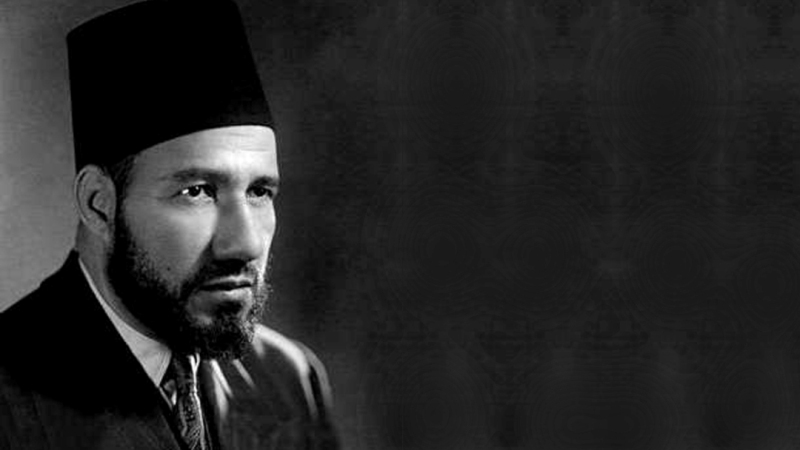
Hassan al-Banna and the Foundations of Islamic Revivalism
By Ayesha Omar
Hasan al-Banna (1906–1949) is widely recognised as the father of contemporary Islamism, having founded the Muslim Brotherhood (al-Ikhwan al-Muslimun) in 1928. Born in 1906 in Mahmudiyah, Egypt, al-Banna belonged to a religious family where his father served as an Imam and Qur’an teacher. At the age of seventeen, al-Banna chose to study at the Dar al-‘Ulum, a prominent teachers’ college in Cairo, instead of pursuing advanced religious education. His understanding of education (tarbiyya) emphasised moral instruction, akin to Aristotle’s concept, focusing on the cultivation of a virtuous life according to Islamic principles rather than mere academic mastery. Al-Banna believed that the ultimate goal of knowledge was not personal gain or material success, but the promotion of the Good Life as defined by Islam, applicable to all subjects, including the Qur’an, public health, politics and economics. He viewed teaching as a vocation and religious calling, positioning a teacher as a murshid (religious guide) who leads by example and argument.
Al-Banna’s commitment and vision for Islamic revivalism were shaped by what he perceived as the insidious influence of Western materialism and colonialism in Egypt. Colonialism, he argued, was a form of cultural imperialism that sought to impose Western values on Muslim societies, undermining their Islamic identity and moral fabric. In his seminal text “Toward the Light” (1947), al-Banna outlines a powerful articulation of the principles that sought to underpin a project of Islamic revivalism in the context of mid-20th century Egypt. He describes Islam at a crossroads, arguing that it poses two conditions: “The first is the liberation of the nation from its political bonds so that it may obtain its freedom and regain its lost independence and sovereignty. The second is its reconstruction so that it may take its own way among the nations and compete with these others in its progress toward social perfection.”
The text was originally composed as a message to various leaders, including King Faruq of Egypt, and begins with an invocation entitled “The Shepherd’s Responsibility.” Here, al-Banna emphasises the crucial role of those tasked with political authority to guide the nation ethically and morally, asserting that their responsibilities are divinely mandated:
“God has delegated rulership over this nation to you and has made its interests, its affairs, its present and its future your trust and your charge: you are responsible for all of these before God (Blessed and Almighty is He!). If the present generation is your instrument, the coming generation is your product. How mighty is this trust, and how great this responsibility, that a man should be held answerable for a nation.” [The Prophet Muhammad stated:] “Each of you is a shepherd, and each is responsible for his flock.”
Al-Banna further analyses the fragmented state of the Muslim community, attributing its decline to colonial influences and internal divisions. He advocates for a reform of Islamic education that harmonises traditional teachings with modern sciences, underscoring the importance of moral and social reform to uplift the community. He calls for unity among Muslims to strengthen their collective identity and resist external pressures while also encouraging active political engagement to reclaim autonomy and establish governance rooted in Islamic principles.
Al-Banna’s charismatic leadership and oratory skills enabled him to connect with a diverse audience, from urban labourers to rural peasants, fostering a broad base of support for his vision of an Islamic society. His gradual approach to reform, focusing on social welfare projects and community mobilisation rather than immediate political power, informs the vision of the Muslim Brotherhood Movement to the present day. Indeed, it is al-Banna’s ideas and organizational strategies that laid the groundwork for developing the identity and transnational appeal of the movement.
In his inaugural speech on June 30, 2012, the late Egyptian president Mohamed Morsi invoked al-Banna’s vision by emphasising the need for a “new Egypt” that aligns with Islamic values and principles. He stated that the revolution was not just about political change but also about moral and social reform, echoing al-Banna’s approach to active socio-political reform. There is no doubt that al-Banna’s legacy endures as a foundational influence on Islamist movements worldwide and that his teachings continue to resonate with new generations of activists and thinkers who view his vision as a guiding framework for addressing the challenges faced by Muslims in an increasingly complex global landscape.
Dr Ayesha Omar is a Senior Lecturer in Political Studies at the University of the Witwatersrand and currently a British Academy International Fellow at SOAS, University of London. She is working on a new book project on Black Intellectual History in South Africa.


